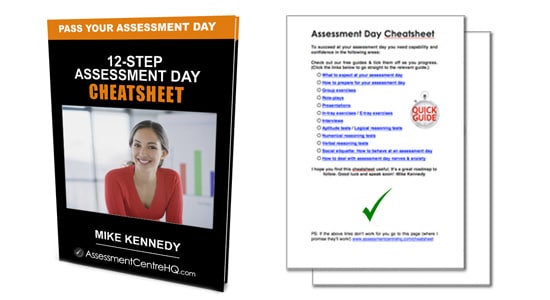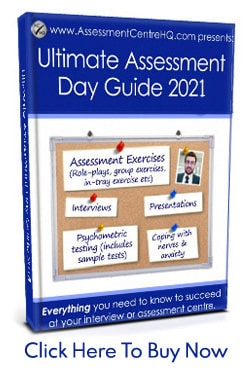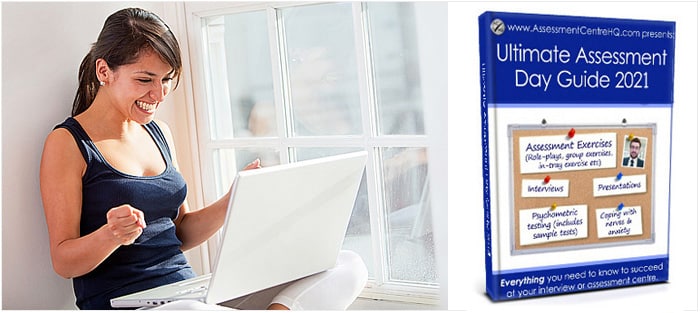Mastering Group Exercises: Your Path to Assessment Day Success
Download our Ultimate Assessment Day & Interview Guide 2022 here. (It's packed with tips, tricks and insider-secrets to help you succeed.)
Want to know how to pass a group exercise on your interview or assessment day? We have everything you need.
2 Useful Starting Point Resources
- You can listen to our podcast on how to succeed in a group exercise here.
- You can get a hold of a full suite of interview preparation tools here.
What Is the ‘Group Exercise’?
The group exercise (sometimes called the group discussion) is a common assessment centre activity widely used by most major employers in the UK and US.
What Happens During a Group Exercise?
Candidates will work in a team to perform an activity while being watched by assessors. The assessors will make notes and score the candidates based on their respective contributions to the exercise.
The assessment centre group exercises can take a variety of forms. You may need to:
- Discuss a general topic or area of current affairs (e.g., “Migrants from Europe are draining the economy of the UK”)
- Debate a work-related problem before finding a solution and presenting it back to the assessors as a group
- Complete a task (e.g., work through a case study, role-play a scenario, or solve a puzzle.)
The team exercise is one of the most revealing assessment centre activities because it forces candidates into a social setting where they have to work together and deal with a mixture of personalities, all of whom are determined to succeed.

Assessment Group Exercises
Example Group Exercise: Survival
- You and your group have found yourselves in a perilous situation as described below.
- There is a long list of items that you can use to aid your survival, but you can only take a small number of these items with you.
- Your task is to work out between yourselves which items you will take and explain why you have chosen these items.
- The assessors will watch from the sidelines, with each assessor focusing on a specific candidate. They will play no part in the exercise and you will normally forget they are there.
- There will be no definite right or wrong answer to the task; the assessors are interested more in how you work as a team and the process through which you come to a group consensus. Group members will be scored on their individual input, rather than the overall result for the group, so someone may still do very well in a team that has failed to reach a conclusion.
- The exercise will usually last around 20 minutes. At the end of the exercise, a member of the group may be asked to present the list of chosen items.
- Read through the below exercise, and if possible, try it out with some friends!
Example Group Exercise: Practice Test
On your way back from a holiday in South America, your shuttle flight to the airport is forced to make an emergency landing in a small clearing in the Brazilian rainforest.
You, the pilot, and your fellow passengers have only sustained minor injuries, but the plane has broken into pieces and the communication equipment has been destroyed in the impact.
Before the plane crashed, the pilot had reported a problem with one of the engines, so there is a good chance that the authorities will start looking for you when you fail to arrive at your destination. However, the forest is very dense and it will take days to reach the edge of it on foot.
You cannot remain where you are as there is a danger that the airplane fuel will catch fire.
On searching through the wreckage and the remains of your suitcases you find the following items:
- A guide to South American plant species
- 3 elasticated luggage straps
- 6 frozen airline meals
- 4 blankets from the plane
- A pack of 24 anti-malaria tablets
- A 3-metre square piece of opaque plastic sheeting
- A tourist map of Brazil
- 2 large bottles of factor 12 sunscreen
- A mobile phone with GPS, fully charged
- 1-litre bottle of the local alcoholic spirit
- 3 boxes of chocolate chip cookies
- 4 current paperback novels
- A first-aid box
- A compass
- A flare gun with one flare
- A Swiss Army knife
- A book of matches from the hotel
You are unable to carry more than 7 items from this list. Items containing more than one “>object still count as one item.
You have 20 minutes to reach your conclusion and present it back to the assessors.
.
Stop worrying! Download a 12-step assessment day cheatsheet & be perfectly prepared.
Click here to download your copy

.
Practice Makes Perfect
During your assessment centre group exercises, you should carry yourself properly. We will discuss that in a bit.
Remember: you can get a hold of a full suite of interview preparation tools here and you can practice real assessment day exercises here .
How to Succeed in Your Group Exercise
It is important to set yourself apart during the group task. Making a good impression during this exercise can have a powerful impact on the assessors. Let’s look at some specific ways to succeed in the group exercise.
If Possible, Take the Lead
Whoever assumes the leadership role automatically gets a head start on the other competitors. Being prepared to show initiative and take responsibility in this way is viewed positively by most assessors. Don’t force it in an unnatural way – but if possible, take the lead.
A good way to position yourself like this is to offer to be the timekeeper during the exercise. Do this as early as possible in the activity. None of the other candidates will refuse your kind offer and it immediately puts you in a positive/responsible light in the eyes of the group and also the assessors. With this practical and collaborative suggestion, you have become part of the leadership and an ‘authority figure’ in the group!
Be Calm and Assertive, Not Aggressive
It can be difficult to put your personality across in a well-rounded way during the team exercise because every candidate wants to make a good impression and each candidate will have a different view of how best to achieve that. Some will be aggressive and dominating because they want to demonstrate drive, leadership skills, or passion. Others will be overwhelmed and feel so nervous that they struggle to get a foothold in the discussion at all.
Make sure you take part, be forceful if you need to be, but smile and be polite and positive at the same time. Strive to be calm and assertive rather than aggressive.

Include Others
Teamwork, cooperation, and the ability to listen to others are important.
Introduce Yourself to Everyone with Genuine Warmth
[Note: Ideally, this is something you should do before the group exercise.]
At some point after your arrival, the candidates will all be standing/sitting together, most likely feeling nervous and being very quiet as they wait to begin an assessment activity.
Use this time to introduce yourself to the others. Smile at them warmly as you shake their hands. Not only does this break the ice and project a confident image, it also gets them on your side and this will help you throughout this and other exercises.
People Love It When You Use Their Names
Make an effort to remember the names of other candidates. This shows that you are well-mannered and attentive, but it also demonstrates you have a good eye for detail and predisposes them to like you.
Be natural when calling their names, and combine them with a compliment such as “Great point, Emma?” or “What do you think, Tom?” This makes you seem personable and a team player.
Negativity Is Verboten
Regardless of what happens, do not be rude and criticise people in an out-of-line way. This reflects poorly on you and suggests you complain a lot. No one wants to hire someone who complains all the time and blames a lot of things on others.
Practice, Practice, Practice
Nothing will improve your performance on the day more than familiarity with the exercise. It will increase your competence and also make you feel at ease. If you are comfortable and relaxed, you will perform better.
Podcast
You can listen to our podcast on how to succeed in your team exercise (a companion to this article) by clicking here.
Follow the 5 Killer Tips!
This short video rolls up the key points for you:
Positive & Negative Behaviours – Checklist
Lastly, here are some ideas on both positive and negative behaviours associated with the common competencies that are assessed during a group exercise (+ indicates a positive behaviour and – a negative behaviour). Aim for the plus signs!
Teamwork
+ Who brings other people into the discussion
+ Who encourages other people’s contributions
+ Who builds on and adapts others’ ideas
+ Who appropriately challenges people’s views
+ Who volunteers to keep track of the time / take notes
– Who talks too much
– Who is insensitive to the feeling of others
Influence
+ Who helps shape the discussion and takes charge
+ Who keeps the discussion on track
+ Who ensures that everyone understands the objectives & whose points are accepted
– Whose arguments are ignored/talked over
Communication
+ Who listens before contributing
+ Who contributes consistently throughout the discussion
+ Who is clear and concise throughout the discussion
– Who is very dominant – always interrupting others
– Who does NO talk at all
Problem Solving
+ Who uses the information provided effectively
+ Who provides creative solutions to the problems
– Who wanders from the subject or introduces unnecessary tasks
Commercial awareness
+ Who understands the business and nature of the industry
+ Who ensures that the suggestions and recommendations are appropriate for the business
+ Who understands the brief and sticks to it
Related Study Guide – How to Prepare for DDI Leadership Test?
More Free Articles that Will Help You
- Do you have to take a numerical reasoning test or a verbal reasoning test? If so you may want to check out the aptitude tests section of the site.
- You can find practice tests and tons of free advice on every other type of ‘reasoning test’ too: numerical, verbal, abstract, logical, inductive, diagrammatic, spatial, mechanical comprehension, UKCAT and Watson-Glaser tests.
- Worried about your assessment day? Maybe you’re worried about performing a presentation or preparing for an interview or group exercise or in-tray exercise?
- Perhaps you’d like some guidance on how to deal with nerves & anxiety at your interview?
- Lastly, the Tools and Resources page is packed with useful equipment and ‘A’ List recommendations that will make your life easier.
Final Thoughts
While an assessment centre team exercise can be daunting, coming in with the right mindset and preparation does wonders. For example, if you have worked on improving your interpersonal skills, problem-solving abilities, and communication skills, you would not find it hard to listen carefully to others, work with them, and even assume a leadership role during a group exercise.
Do the work and trust yourself. It will work out.
Turbocharge your employability NOW
Get your copy of our Ultimate Assessment Day & Interview Guide here. It's packed with tips, tricks and insider-secrets to help you succeed.
.
© Copyright AssessmentCentreHQ - All Rights Reserved
.
FAQs
1. How Do You Succeed in Group Exercise?
There are a few key things to remember when it comes to succeeding in a group exercise:
1. Come prepared. Make sure you know the moves and have the right equipment.
2. Pay attention. It’s important to watch the instructor and follow along.
3. Stay focused. It can be easy to get distracted in a group setting, but it’s important to stay on track.
4. Have fun!
2. What Is a Group Exercise? Can You Give an Example?
A group exercise is when an activity where a group of people work together to achieve a common goal. An example of this would be a team project in school.
3. What Happens in a Group Exercise?
A group or team exercise can provide a sense of community, support, and accountability. It can also help people feel more comfortable trying new things and provide a sense of belonging. Group exercises can be fun and motivating, and they are a great way to get in shape with friends.
4. How Can an Individual Succeed in Group Assessments?
There are a few things that an individual can do to succeed in group assessments. First, be sure to participate in the discussion and offer your ideas. Next, be respectful of other people’s opinions, even if you don’t agree with them. Finally, be sure to stay on task and complete all of your work on time.
5. What Are the Benefits of Group Exercise?
Group or team exercise has many benefits, including:
- Increased motivation: Working out with others can help keep you motivated and on track.
- Increased accountability: When you have others relying on you to show up for a workout, you’re more likely to stick to your routine.
- Variety: Group classes offer a variety of exercises and routines, keeping your workouts fresh and exciting.






